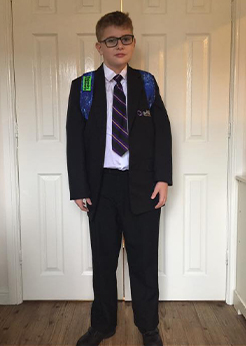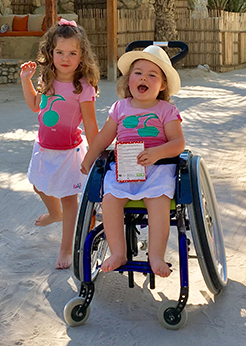Research
To date, the Foundation has funded and/or supported the following ongoing research projects:
Molecular Pathogenesis and Epigenetic Rescue of Novel Human Models of ZC4H2 Associated Rare Disorders
Dr. Julian Halmai, PhD- University of California, Davis, USA.
This research will include the generation of novel research tools: Three iPSCs lines from 3 different pathogenic variants of ZC4H2 and organoid models of ZARD in addition to studying a specific ZARD disease mechanism in these models. This project offers valuable research tools as well as broadening insights in the disease mechanism of ZARD by further studying a known mechanism for ZARD pathogenesis (BMP-signaling) in cortical organoid models. This grant was generously funded by donors to the 2024 Million Dollar Bike Ride campaign in partnership with the Orphan Disease Center.
Neuromuscular Activation of Muscle in Children with the ZC4H2 Mutation
Dr. Richard Lieber, PhD- Shirley Ryan AbilityLab Chicago, Illinois, USA.
This research will determine whether the weakness experienced by children with ZC4H2 mutation is primarily due to their inability to voluntarily recruit muscle groups or weaknesses in the muscle itself. This will be accomplished by measuring both mechanical and electrical activity of the major flexors and extensors in the body. In this way, we can focus development on therapies related to the actual functional problem in these children. This grant was generously funded by donors to the 2023 Million Dollar Bike Ride campaign in partnership with the Orphan Disease Center.
Natural History Study on ZC4H2 Associated Rare Disorders (ZARD)
Dr. David Bearden, MD- University of Rochester, New York, USA.
This project, generously funded by the University of Rochester, is the first Natural History Study on ZC4H2 and aims to understand the natural progression of ZARD over time. With this study, we will be able to better understand ZARD and its prognosis and hopefully develop better treatments for children living with ZARD. The study will be conducted remotely and will have participants from all over the world. To enroll or find out more click here. For Dr. Bearden’s presentation on his findings click here. The most recent publication from Dr. Bearden’s findings can be found here. For parents requesting the full paper, please email the Foundation.
Targeted reactivation of ZC4H2 using miniature Cas editors
Dr. Julian Halmai, PhD- University of California, Davis, USA.
For Dr. Halmai’s presentation on his findings, click here. This grant was generously funded by donors to the 2022 Million Dollar Bike Ride campaign in partnership with the Orphan Disease Center.
Structural and Functional Investigation of the ZC4H2 Protein
Dr. Fahad Ali, PhD- Mohammed Bin Rashid University of Medicine and Health Sciences, Dubai, UAE.
For Dr. Ali’s presentation on his findings, click here. This grant was generously funded by donors to the 2022 Million Dollar Bike Ride campaign in partnership with the Orphan Disease Center.
Studies on ZC4H2 to help better understand the pathophysiology of ZARD
Dr. Vera Kalscheuer,
This project focuses on the creation of an antibody to detect the ZC4H2 protein. This will be beneficial to all researchers studying the disease. Funds will also go to creating mouse models with the same mutations as ZC4H2 patients. RNAseq analysis is performed on embryos from the mouse models, which is a technique to look at expression of all proteins in the cell. This may reveal pathways affected by loss of the protein during early development.
Nucleic acid binding by ZC4H2
Prof. Daniel Dominguez,
ZC4H2 was identified as a protein that binds to DNA. This project focuses on the identification of different target DNA sequences that the protein binds to. The results may reveal proteins in pathways that require ZCH42 for appropriate function.
Deciphering the structural consequences of ZC4H2 germline rare variants
Prof. Michal Linial –
In this research project, computational modeling is used to study ZC4H2 protein-protein interactions. The research looks at interactions of ZC4H2 with its known binding partner SMAD, a protein involved in neuronal development. This research may reveal why specific mutations in ZC4H2 affect binding to its target proteins.
Creation of an Induced Pluripotent Stem Cell (iPSC) line
The Coriell Institute for Medical Research.
This project aims to develop the first iPSC line from a ZARD patient. The cells will be stored and available for usage in any future research projects.
Analysis of the morphology and biology of skeletal muscles in ZARD
Prof. R. Lieber and Dr. Rajeswari Pichika –
This first-ever study on the morphology and biology of ZARD muscles is being conducted with biopsies from three different skeletal muscles of a female ZARD patient.




ZC4H2 Research Foundation, Inc. All rights reserved.
ZC4H2 Research Foundation has been recognized by the Internal Revenue Service as a 501(c)(3) organization. EIN: 87-4577599




